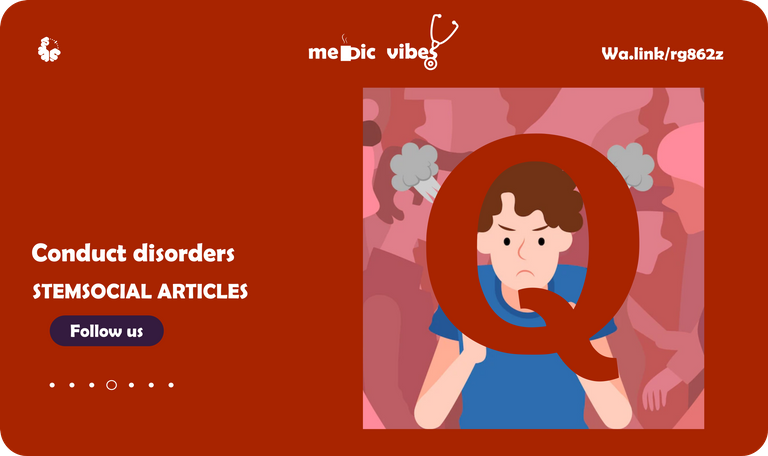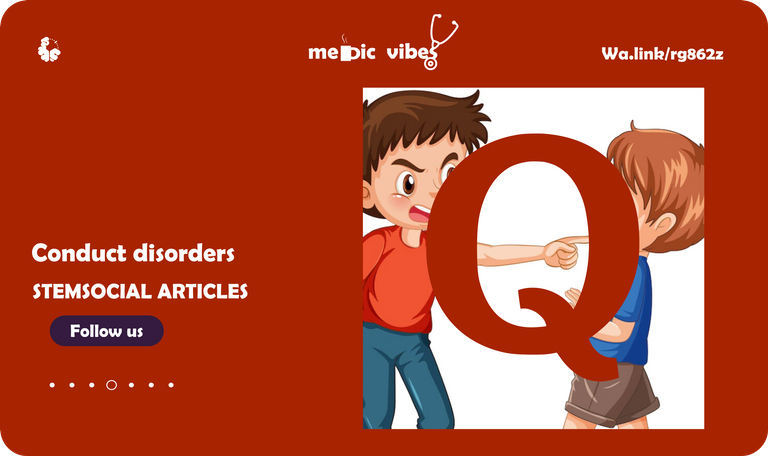Antisocial Personality Disorder Without Conduct Disorder(Reaction)
In the last post, we saw how:
- Oppositional defiant disorder, is a behavioral disorder that is characterized by a pattern of disobedient, defiant, and hostile behavior towards authority figures.
- Conduct and Schizohrenia are two different mental health conditions, psychosis can make a person present with some antisocial features but these are two different conditions.
- The treatment for oppositional defiant disorder is a combination of psychotherapy and pharmacotherapy.
What’s the difference between conduct disorder and schizophrenia aggression?
Welcome to Medic Vibes, where we discuss mental health disorders and make sense of them. Dr Ebingo Kigigha is a medical doctor (aspiring psychiatrist) and creative person (illustration and music). This has been our routine for four consecutive months. This month will be dedicated to Conduct disorder. In the first month, we discussed Depression, and in the subsequent month, anxiety. We just finished with Eating disorders.
In this post, we are looking at Tik Tok. To learn more just keep scrolling down. You can also skip to the key point of the post if you which or go to the conclusion to get the summary.

Kleptomania, also known as compulsive stealing, is a disorder characterized by an irresistible urge to steal items that are not needed for personal use or for financial gain. This disorder is classified as an Impulse Control Disorder (ICD), a category of disorders that involve the inability to resist urges, impulses or cravings that can lead to harmful behavior.
According to the National Institute of Mental Health (NIMH), kleptomania is a rare disorder, however, it is estimated that about 1 in 50 people may be affected by it at some point in their lives. It is more common in females than in males, with some studies suggesting that the ratio of females to males with kleptomania is 3:2. The disorder typically develops during adolescence or early adulthood, although it can also appear in later life.
Kleptomania is often comorbid with other mental health conditions, such as major depressive disorder, bipolar disorder, or substance abuse. It is often associated with poor social, occupational and educational functioning. Even though it is rare, it can have serious consequences if not treated, as it may lead to legal problems, social isolation, and financial troubles.
According to research, brain chemistry and neurotransmitters are thought to play a role in the development of kleptomania. Specifically, low levels of serotonin, dopamine, and norepinephrine have been linked to the disorder. These chemicals play a role in regulating mood, impulse control, and decision-making, which are all affected in kleptomania.
Cognitive and behavioral factors, such as low self-esteem, poor impulse control, and a history of childhood abuse or trauma, may also contribute to the development of kleptomania. Individuals with kleptomania often have a sense of feeling powerless and may steal to gain a sense of control or to cope with negative emotions.
Additionally, genetics may play a role in the development of kleptomania. Studies have suggested that kleptomania may run in families, indicating a possible genetic component. However, more research is needed to understand the specific genetic factors involved.
The DSM-5 says that, to be diagnosed with kleptomania, an individual must meet certain criteria, such as recurrent failure to resist impulses to steal objects that are not needed for personal use or for their monetary value, increasing sense of tension or arousal before the act of stealing, and a sense of pleasure, gratification, or relief when committing the theft. Additionally, the individual must not have any other underlying mental disorder, such as bipolar disorder or antisocial personality disorder, that would explain the stealing.
A healthcare professional will typically conduct a comprehensive assessment, including a physical examination, psychological evaluation and interview, and possibly lab tests and imaging studies to rule out any other underlying conditions. They may also gather information about the individual's personal and family history, including past behavior and any previous treatment.
It is important to note that the individual should have a clear insight that the stealing is excessive or unreasonable and not associated with conduct disorder or other mental disorder as this can differentiate from other diagnoses. It is also important that a healthcare professional is able to distinguish it from normal criminal behavior.

Antisocial Personality Disorder Without Conduct Disorder(Reaction)

Image by brgfx on Freepik
According to Maiki, a counselor, it is possible for a person to be diagnosed with Antisocial Personality Disorder (ASPD) if they did not receive adequate help or support during childhood from their parents. Many individuals may be living without a diagnosis, without understanding or support, and this lack of awareness is a significant problem.
According to the Diagnostic and Statistical Manual of Mental Disorders, 5th Edition, Antisocial Personality Disorder is characterized by a persistent pattern of disregard for and violation of the rights of others. A key criteria for a diagnosis is a history of conduct disorder in childhood or adolescence. However, it is possible to be diagnosed with ASPD without a history of conduct disorder. This can include engaging in behaviors such as deception, impulsivity, manipulation, and a lack of empathy or remorse.
A diagnosis of ASPD requires that an individual be at least 18 years of age and exhibit a pattern of at least three of the following criteria: failure to conform to social norms with respect to lawful behaviors, deceitfulness, impulsivity or failure to plan ahead, irritability and aggressiveness, reckless disregard for safety of self or others, consistent irresponsibility, and lack of remorse. It's important to note that a diagnosis can only be made by a qualified mental health professional and takes into account the individual's entire history and behavior, not just a single event or isolated instance.

Treating Kleptomania
Treatment for kleptomania typically involves a combination of therapy and medication. One type of therapy is cognitive-behavioral therapy, which aims to help the individual understand the thoughts and behaviors that lead to stealing. The individual will then develop strategies to change these thoughts and behaviors.
Another type of therapy is dialectical behavior therapy, which aims to help the individual learn how to accept and change negative thoughts and behaviors. Medication can also be used as a treatment option. Selective serotonin reuptake inhibitors, such as fluoxetine and fluvoxamine, have been found to be effective in reducing the symptoms of kleptomania.
It is important to note that treatment of kleptomania will not guarantee a stop in stealing. However, it will help the patient to decrease the urge to steal and learn new coping strategies. Other types of medication that may be used include mood stabilizers and antipsychotic drugs.
Questions
- What did you learn about Conduct disorders?
Conclusion
- ASPD: persistent disregard for rights, impulsivity, aggression, no remorse. Can be diagnosed with or without CD in childhood.
- Treatment for kleptomania involves a combination of therapy and medication to decrease the urge to steal and learn new coping strategies.

References
Page demarcations made with Inkscape.org


Dear @medicvibes,
Our previous proposal expired end of December and the Hivebuzz project is not funded anymore. May we ask you to review and support our new proposal (https://peakd.com/me/proposals/248)?
Thank you for your help!
Thanks for your contribution to the STEMsocial community. Feel free to join us on discord to get to know the rest of us!
Please consider delegating to the @stemsocial account (85% of the curation rewards are returned).
You may also include @stemsocial as a beneficiary of the rewards of this post to get a stronger support.